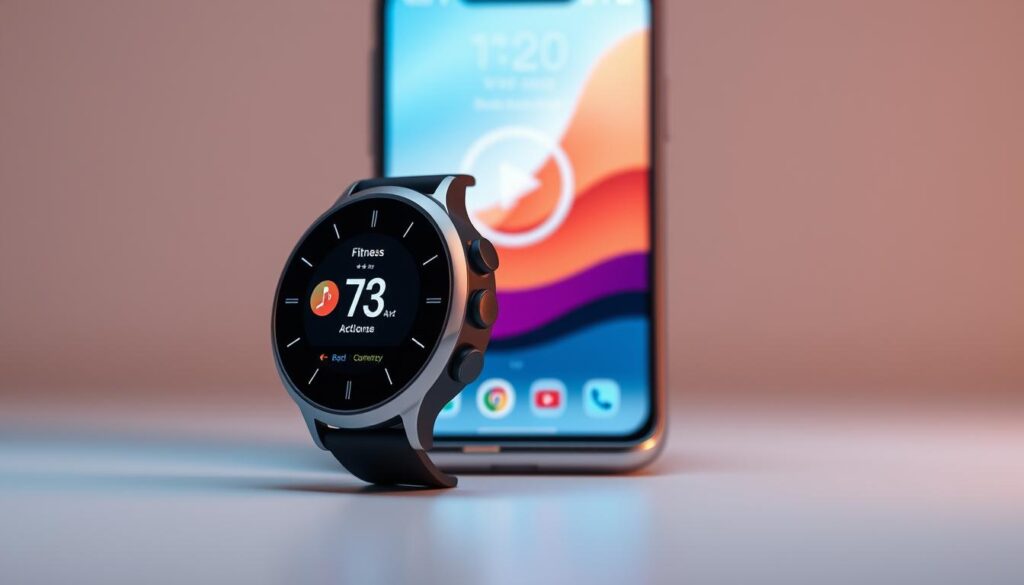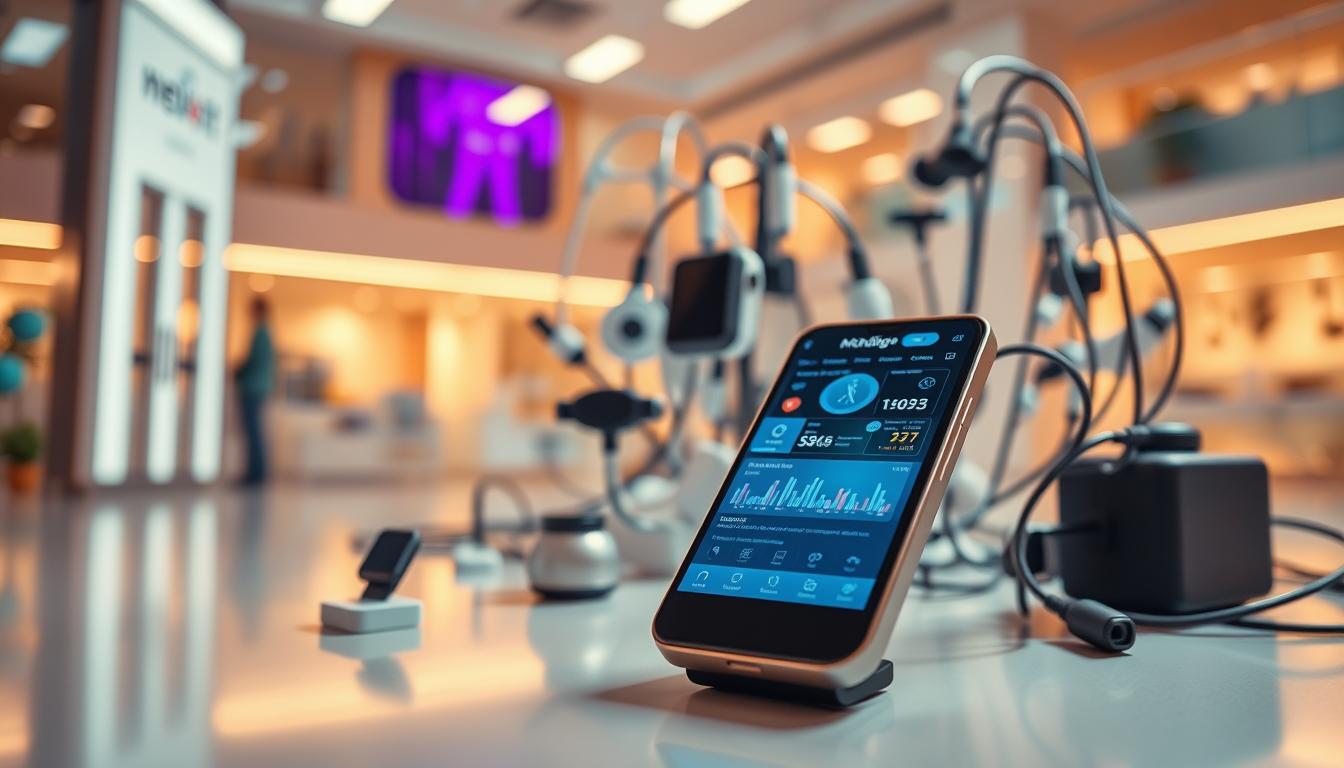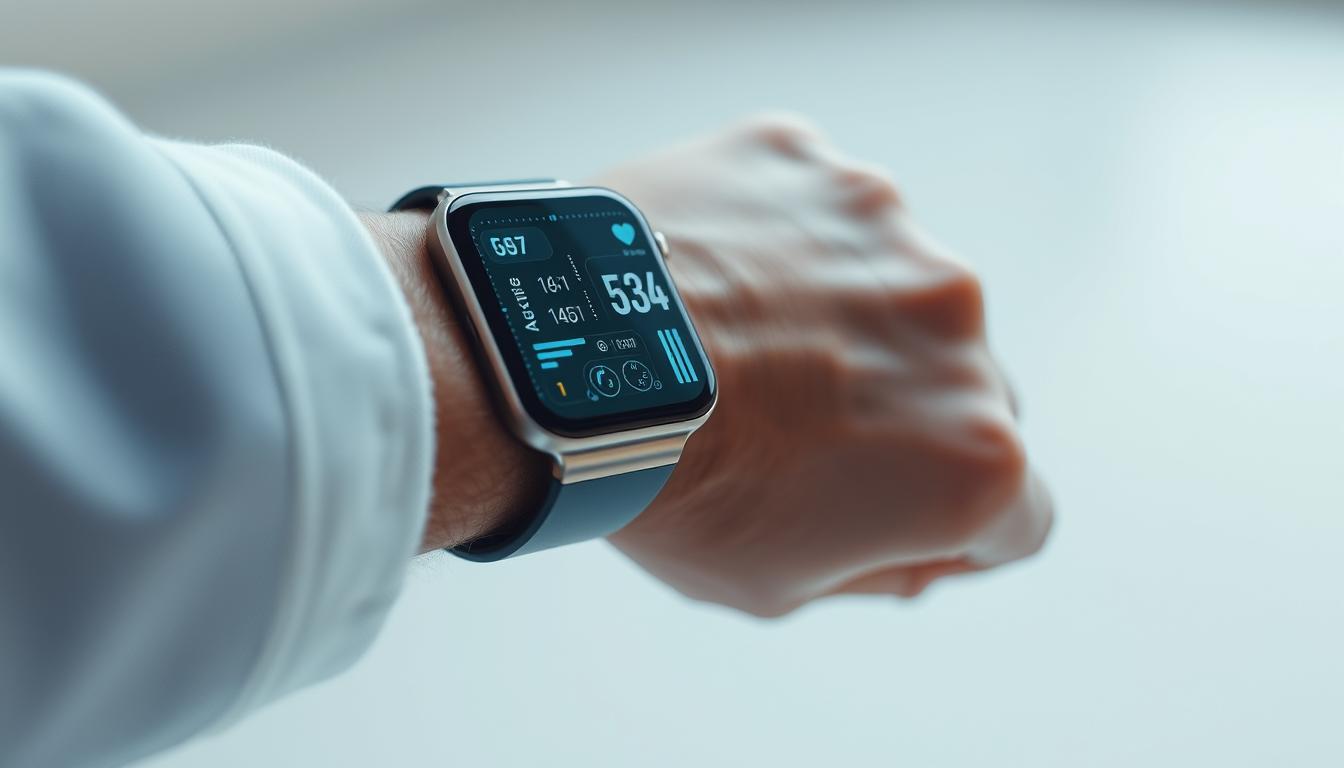This post contains affiliate links. As an Amazon Associate I earn from qualifying purchases
In today’s digital age, managing our well-being has become more accessible thanks to mHealth advancements. With numerous options available, selecting the right mobile health app can be overwhelming.
This article aims to guide you through the best mobile health solutions, their benefits, and how to choose the most suitable one for your needs. By exploring the latest trends in mobile health technology, you’ll be able to stay ahead in your health journey.
Key Takeaways
- Understanding the different types of mobile health apps available.
- Learning how to choose the best app for your specific needs.
- Discovering the benefits of using mHealth advancements.
- Staying updated on the latest trends in mobile health technology.
- Maximizing your health journey with the right mobile health app.
Understanding Mobile Health Apps
With the proliferation of smartphones, mobile health apps have emerged as a vital component of modern healthcare. These apps are designed to support and enhance healthcare by providing users with tools to manage their health more effectively.
What Are Mobile Health Apps?
Mobile health apps, or mHealth apps, are software applications designed for mobile devices that help users monitor and manage their health. They can range from simple fitness trackers to complex mental health support platforms. These apps leverage health app development advancements to offer personalized health advice, track physical activity, monitor nutrition, and provide mental health support.
The diversity in mobile health apps means that there’s something for everyone, whether you’re looking to improve your physical health, mental well-being, or both. By utilizing these apps, users can take a more proactive role in their health management.
Benefits of Using Mobile Health Apps
The mobile app healthcare benefits are numerous. For one, these apps provide users with the ability to track their health metrics in real-time, offering insights that can lead to better health decisions. They also offer personalized recommendations based on the data collected, helping users achieve their health goals more effectively.
- Track health metrics in real-time
- Receive personalized health recommendations
- Monitor and manage chronic conditions
- Enhance mental health through stress management and mindfulness exercises
By integrating these tools into daily life, individuals can experience significant improvements in their overall health and well-being. As health app development continues to evolve, we can expect these apps to become even more sophisticated, offering more precise and personalized health tracking technology.
Types of Mobile Health Apps
With the rise of digital health solutions, mobile health apps have become indispensable tools for managing our well-being. These apps cater to various health needs, making it easier for individuals to take control of their health.
Mobile health apps can be broadly categorized into several types based on their primary functions. Understanding these categories is crucial for selecting the right app that aligns with one’s health goals.
Fitness and Workout Apps
Fitness and workout apps are designed to help users track their physical activity, provide personalized workout routines, and offer guidance on exercise techniques. Many of these apps integrate with wearable devices, enhancing their functionality through fitness app integration.
Nutrition and Diet Tracking Apps
Nutrition and diet tracking apps assist users in monitoring their dietary habits, tracking calorie intake, and receiving nutritional advice. These apps often include databases of various foods, making it easier to log meals and track nutritional intake.
Mental Health Apps
Mental health apps provide support and resources for managing mental well-being. They offer features such as meditation guides, mood tracking, and access to professional counseling services. These apps play a vital role in making mental health support more accessible.
By understanding the different types of mobile health apps available, users can make informed decisions about which apps best suit their health and wellness needs. Whether it’s tracking fitness goals, monitoring diet, or supporting mental health, there’s a mobile health app designed to help.
Popular Mobile Health Apps in 2023
The growing demand for health tracking technology has led to the emergence of several top-notch mobile health apps in 2023. These applications have revolutionized the way we monitor our health and fitness, providing personalized insights and guidance.
Several mobile health apps have gained popularity due to their effectiveness and user-friendly interfaces. Let’s take a closer look at some of the most popular ones:
MyFitnessPal
MyFitnessPal is a leading diet tracking app that boasts an extensive database of over 5 million foods. It allows users to track their daily calorie intake, macronutrients, and exercise. The app is available for free, with optional premium features.
- Tracks daily calorie intake and macronutrients
- Large database of foods and exercises
- Optional premium features for enhanced functionality
Headspace
Headspace is a popular mental health app that offers guided meditation and mindfulness exercises. It aims to reduce stress and improve mental well-being. The app provides personalized meditation sessions based on user goals and progress.
“Headspace has been a game-changer for my mental health. The guided meditations are incredibly helpful.” – User Review
Fitbit
Fitbit is a well-known fitness tracking app that syncs with Fitbit wearable devices. It tracks various health metrics, including steps taken, distance traveled, and calories burned. The app also allows users to log their food intake and participate in challenges.
These mobile health apps have become essential tools for individuals seeking to improve their health and fitness. By leveraging advanced health tracking technology, they provide valuable insights and support to help users achieve their wellness goals.
Choosing the Right Mobile Health App
The process of selecting a mobile health app can be simplified by understanding your health goals and what features are important to you. With the latest mHealth advancements, there’s a wide range of digital health solutions available, catering to various health needs. Whether you’re looking for fitness tracking, mental health support, or nutrition advice, identifying your priorities is key.
Assessing Your Health Goals
Before diving into the world of mobile health apps, it’s crucial to assess your health objectives. Are you looking to improve your physical activity, manage stress, or monitor your diet? Understanding your goals will help you narrow down your options and choose an app that aligns with your needs.
- Identify your primary health concern
- Set specific, measurable goals
- Consider your lifestyle and preferences
Features to Look for in an App
Once you’ve defined your health goals, it’s time to look for an app that offers the right features. Some key features to consider include:
- Personalized recommendations based on your health data
- Integration with wearable devices or other health apps
- Reminders and notifications to stay on track
- Community support or coaching services
By focusing on these features and aligning them with your health objectives, you can find a mobile health app that truly supports your well-being. The right app can make a significant difference in achieving your health goals, leveraging the latest mHealth advancements to provide a more personalized experience.
User Experience and Interface
A mobile health app’s effectiveness is heavily influenced by its user experience and how intuitive its interface is. The benefits of a well-designed app are numerous, including enhanced user engagement and improved health outcomes, which are key aspects of mobile app healthcare benefits.
Importance of Ease of Use
Ease of use is a critical factor in the success of a mobile health app. An app that is complicated or difficult to navigate can lead to frustration and abandonment. On the other hand, an app with an intuitive interface encourages consistent usage, thereby maximizing its health app development potential.
To achieve ease of use, developers focus on creating clean and simple designs, minimizing the number of steps required to perform tasks, and ensuring that the app is responsive across different devices.
Accessibility Features
Accessibility features are also crucial in mobile health app development, ensuring that the app is usable by everyone, including those with disabilities. This includes features such as font size adjustment, screen reader compatibility, and high contrast mode.
By incorporating these features, developers can significantly enhance the user experience, making the app more inclusive and beneficial for a wider audience. This not only improves the app’s overall usability but also contributes to its healthcare benefits by making health management more accessible.
Integration with Wearable Devices
Mobile health apps and wearable devices are a perfect pair, offering a comprehensive view of one’s health. The integration of these technologies allows for continuous monitoring of vital signs and activity levels, providing a more detailed picture of an individual’s health status.

Benefits of Wearable Device Integration
The benefits of integrating wearable devices with mobile health apps are numerous. Enhanced health tracking is one of the primary advantages, as wearables can monitor a range of health metrics, from heart rate to steps taken. This data can then be synced with health apps, allowing users to track their progress over time.
Another significant benefit is the ability to receive real-time feedback. Many wearables and health apps offer real-time notifications, enabling users to respond promptly to changes in their health or activity levels.
Popular Wearables Compatible with Apps
Several popular wearables are compatible with a wide range of mobile health apps. Fitbit and Apple Watch are among the most popular choices, offering seamless integration with various health and fitness apps. These devices can track everything from exercise and nutrition to sleep patterns and heart health.
When choosing a wearable device, it’s essential to consider compatibility with your preferred health app. Many devices offer cross-platform compatibility, allowing users to select the apps that best meet their health and fitness needs.
Security and Privacy in Mobile Health Apps
With the growing reliance on mobile health apps for managing various aspects of health, the importance of robust security measures cannot be overstated. As these apps handle sensitive personal health information, users must be aware of how their data is protected, especially in contexts like remote patient monitoring.
Protecting Your Personal Health Data
Protecting personal health data is a critical concern for both app developers and users. Developers must implement robust security protocols, including data encryption and secure storage practices, to safeguard user information. Users, on the other hand, should be cautious when granting permissions and ensure they understand what data is being collected and how it is used.
To further enhance data protection, many mobile health apps now offer additional security features such as two-factor authentication and regular security updates. It’s essential for users to stay informed about these features and utilize them to maximize the security of their personal health data.
Understanding App Permissions
Understanding app permissions is crucial for maintaining control over personal health data. When installing or updating a mobile health app, users are often prompted to grant various permissions, such as access to location services, contacts, or camera functionality. It’s vital to review these permissions carefully and understand why they are necessary for the app’s functionality.
- Be wary of apps that request permissions that seem unnecessary for their primary function.
- Regularly review the permissions granted to apps and revoke any that are no longer necessary.
- Use the privacy settings on your device to limit the data shared with apps.
By being mindful of app permissions and taking proactive steps to secure personal health data, users can significantly reduce the risk of data breaches and maintain the privacy of their health information.
Mobile Health Apps for Chronic Conditions
For individuals living with chronic conditions, mobile health apps offer a lifeline to better health management. These apps are designed to provide support and resources tailored to the specific needs of patients managing ongoing health issues.
Chronic conditions such as diabetes and heart disease require consistent monitoring and management. Mobile health apps play a crucial role in this process by offering tools for tracking vital health metrics, providing educational resources, and facilitating communication with healthcare providers.
Diabetes Management Apps
Diabetes management apps are a valuable resource for individuals with diabetes. These apps help track blood glucose levels, monitor carbohydrate intake, and provide personalized dietary advice. Some popular diabetes management apps include MyFitnessPal and Glucose Buddy, which integrate with wearable devices and telemedicine platforms to offer comprehensive care.
Key Features of Diabetes Management Apps:
- Blood glucose tracking
- Dietary planning and nutrition advice
- Integration with wearable devices and telemedicine platforms
Heart Health Apps
Heart health apps are designed to support individuals with cardiovascular conditions. These apps monitor heart rate, track physical activity, and offer guidance on managing heart health. Apps like Fitbit and HeartWatch provide users with insights into their cardiovascular health and offer personalized recommendations for improvement.
The integration of heart health apps with telemedicine platforms enables healthcare providers to monitor patients remotely and make timely interventions when necessary. This integration enhances the overall quality of care and supports better health outcomes for individuals with heart conditions.
Benefits of Heart Health Apps:
- Monitoring heart rate and rhythm
- Tracking physical activity and exercise
- Personalized health recommendations
By leveraging mobile health apps, individuals with chronic conditions can take a more active role in managing their health. These apps not only provide valuable insights and support but also connect patients with healthcare providers through telemedicine platforms, enhancing the continuity of care.
The Role of Mobile Health Apps in Telemedicine
The integration of mobile health apps with telemedicine platforms is revolutionizing the way healthcare is delivered. By enhancing patient-provider communication and facilitating remote monitoring, these apps are making healthcare more accessible and personalized.

Mobile health apps are not just a convenience; they are becoming a crucial component of telemedicine. They allow patients to track their health metrics, communicate with healthcare providers, and receive timely interventions. This integration improves the quality of care and makes healthcare more efficient.
Enhancing Patient-Provider Communication
One of the key benefits of mobile health apps in telemedicine is the enhancement of patient-provider communication. These apps provide a secure and convenient platform for patients to share their health data with healthcare providers. This facilitates timely and informed decision-making, leading to better health outcomes.
- Secure messaging between patients and providers
- Sharing of health data and medical records
- Scheduling of virtual appointments
Facilitating Remote Monitoring
Remote patient monitoring is another significant advantage of integrating mobile health apps with telemedicine. By allowing healthcare providers to monitor patients’ health remotely, these apps reduce the need for in-person visits and enable early intervention in case of any health anomalies.
The use of mobile health apps in telemedicine is transforming the healthcare landscape. As technology continues to evolve, we can expect these apps to play an even more significant role in enhancing patient care and improving health outcomes.
Trends in Mobile Health Apps
The integration of cutting-edge technologies is transforming the mobile health app industry. As we move forward, it’s essential to understand the trends shaping the future of mobile health.
AI and Machine Learning in Health Apps
Artificial intelligence (AI) and machine learning (ML) are revolutionizing health apps by providing personalized experiences and insights. Predictive analytics and personalized recommendations are just a few benefits of integrating AI and ML.
For instance, AI-powered chatbots can offer immediate support and guidance, enhancing user engagement. Moreover, ML algorithms can analyze user data to predict health risks, enabling proactive measures.
The Rise of Telehealth Features
Telehealth features within mobile health apps are becoming increasingly popular, allowing users to access healthcare services remotely. This trend has been particularly significant in expanding healthcare accessibility.
The table below highlights some key aspects of telehealth integration in mobile health apps:
| Feature | Description | Benefit |
|---|---|---|
| Virtual Consultations | Remote meetings with healthcare professionals | Increased accessibility to healthcare |
| Remote Monitoring | Continuous tracking of health metrics | Early detection of health issues |
| Secure Messaging | Encrypted communication between patients and providers | Enhanced patient-provider communication |
As telehealth continues to evolve, we can expect even more sophisticated features that enhance patient care and provider efficiency.
Resources for Finding Health Apps
Discovering the best mobile health app for your needs is made easier with the right resources. With the vast number of health apps available, it’s essential to have tools and guidance to navigate this landscape effectively.
App Review Websites
One of the most effective ways to find a reliable mobile health app is by checking app review websites. These platforms provide detailed reviews, ratings, and comparisons of various health apps, helping you make an informed decision. Some popular app review websites include those dedicated to tech reviews and health-focused publications.
Key Features to Look for on App Review Websites:
- Detailed app descriptions and features
- User ratings and reviews
- Comparisons with similar apps
- Information on app security and privacy
Recommendations from Healthcare Professionals
Another valuable resource is the recommendation from healthcare professionals. Doctors, nutritionists, and fitness experts often suggest mobile health apps to their patients based on their specific needs. These recommendations are typically backed by professional insight into what works best for various health conditions or fitness goals.
The Benefits of Professional Recommendations:
- Trustworthy suggestions based on professional expertise
- Apps tailored to specific health needs or goals
- Guidance on how to effectively use the app
To illustrate the variety of mobile health apps and their features, consider the following comparison:
| App Name | Primary Function | User Rating |
|---|---|---|
| MyFitnessPal | Nutrition and Diet Tracking | 4.8/5 |
| Headspace | Mental Health and Meditation | 4.9/5 |
| Fitbit | Fitness and Activity Tracking | 4.7/5 |
By leveraging app review websites and recommendations from healthcare professionals, you can efficiently find a mobile health app that meets your needs and enhances your healthcare journey.
Future of Mobile Health Apps
The future of mobile health apps is promising, driven by advancements in health tracking technology and digital health solutions. As technology continues to evolve, we can expect to see more sophisticated features that enhance the user experience and provide more accurate health insights.
Advancements in Health Tracking
One potential development to watch is the integration of more advanced AI-driven health insights, enabling users to make more informed decisions about their health. Health tracking technology will continue to improve, allowing for more precise monitoring of vital signs and other health metrics.
Impact on Health Management
The impact of digital health solutions on health management will be significant, enabling users to take a more proactive approach to their health. With the continued development of mobile health apps, users will have access to a wealth of information and tools to manage their health effectively.
FAQ
What are mobile health apps, and how do they work?
What are the benefits of using mobile health apps?
How do I choose the right mobile health app for my needs?
Are mobile health apps secure and private?
Can mobile health apps be used for managing chronic conditions?
How do mobile health apps integrate with wearable devices?
What are the latest trends in mobile health apps?
Where can I find reliable mobile health apps?
This post contains affiliate links. As an Amazon Associate I earn from qualifying purchases



